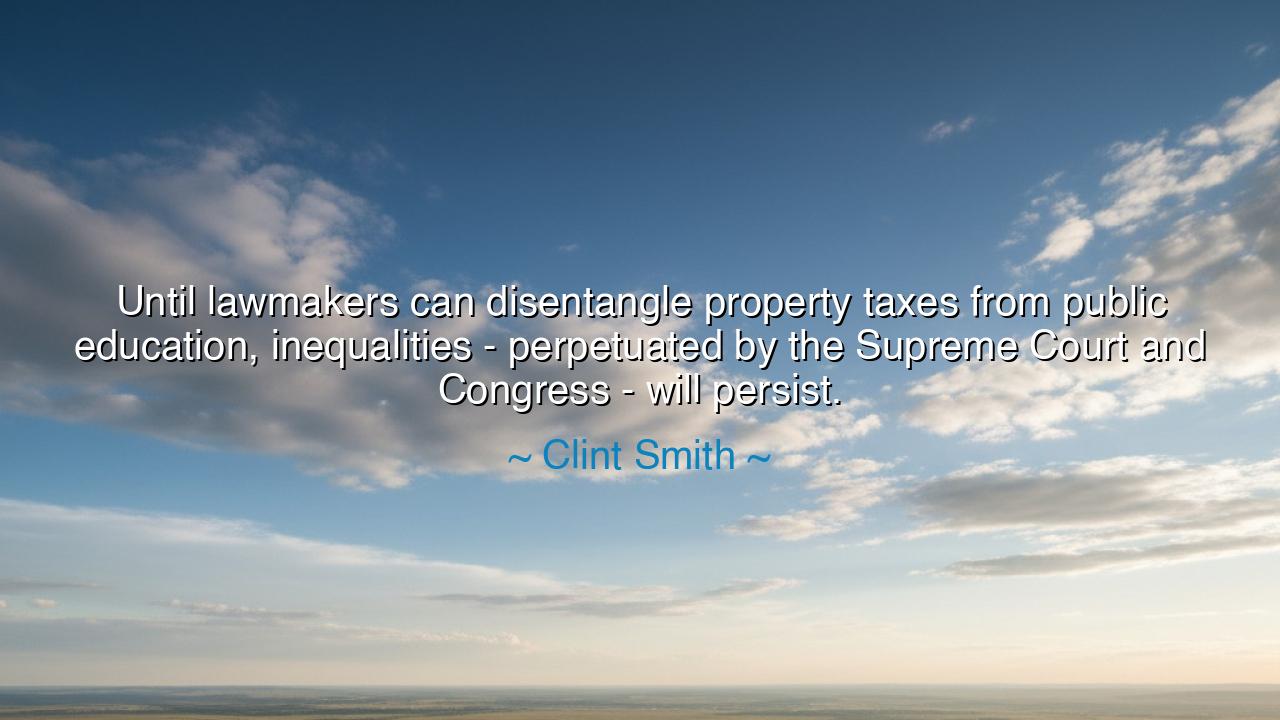
Until lawmakers can disentangle property taxes from public
Until lawmakers can disentangle property taxes from public education, inequalities - perpetuated by the Supreme Court and Congress - will persist.






The words of Clint Smith thunder with the clarity of justice: “Until lawmakers can disentangle property taxes from public education, inequalities—perpetuated by the Supreme Court and Congress—will persist.” In this sentence lies a bitter truth about the foundation of American schooling. The promise of education, which should be the great equalizer of human destiny, has been bound to the chains of property wealth, so that the child born in riches drinks deeply of knowledge, while the child born in poverty is left with crumbs. Smith declares that as long as this system endures, inequality will not merely appear—it will be perpetuated, generation after generation, like an inheritance of chains.
To understand this, one must see the design: in much of America, schools are funded by property taxes. Where houses are grand, the schools gleam with libraries, laboratories, and arts. Where houses are crumbling, the schools are starved, with broken roofs and weary teachers. Thus the soil upon which a child is planted—rich or poor—determines the water of opportunity. This is not the way of justice, but the way of division, and Smith calls upon the people to recognize it as a failing not of accident, but of structure, cemented by lawmakers and upheld even by the highest courts.
Consider the story of San Antonio v. Rodriguez (1973), when the Supreme Court ruled that education was not a fundamental right under the Constitution. The case arose because poor districts in Texas received far less funding than wealthy ones, due to property tax structures. Yet the Court, rather than striking down the system, preserved it, declaring that inequality in education was not a violation of equal protection. With that decision, the gates of privilege were fortified, and the river of inequity was allowed to flow unimpeded. The promise of the nation—to offer equal opportunity to every child—was betrayed by its own guardians.
And yet, history also shows that voices of courage have risen against such injustice. Think of Brown v. Board of Education (1954), when the Court declared that “separate but equal” was a lie, and that segregated schools denied true equality. That ruling cracked the walls of legalized segregation, but the deeper foundations of inequality—funding tied to property wealth—remained intact. The color lines of America blurred, but the poverty lines remained sharp. Thus Smith reminds us that until the root is severed, the branches of inequity will keep bearing fruit.
The meaning of his words is not only about courts and Congress, but about the soul of a nation. For if education is chained to wealth, then democracy itself falters. A people uneducated cannot govern wisely. A society where only some receive the tools of knowledge while others are cast into ignorance cannot be free, for freedom without education is but a shadow. To bind learning to property is to declare, silently, that some children are worth more than others. This is not the spirit of a republic, but the echo of an aristocracy.
The lesson for us is profound: justice requires courage, and courage requires vision. We must not accept as natural what is in truth constructed. If laws have bound education to inequality, then laws must unbind it. Citizens must demand from their leaders not charity, but change; not excuses, but reform. And in our own lives, we must act to uplift schools beyond our own neighborhoods, seeing every child as our own child, every classroom as sacred ground for the nation’s future.
So what actions should be taken? Support policies that fund schools more equitably across districts, so that a child’s education is not determined by the wealth of their zip code. Advocate for leaders who recognize that democracy is only as strong as the minds it educates. Volunteer, mentor, and give where you can, but do not stop at charity—press for systemic reform. For Smith’s warning is clear: inequalities will persist until lawmakers are compelled to act.
Therefore, O listener, take this truth into your heart: the torch of education must not be rationed by wealth, but lifted for all. Until it shines equally upon every child, the nation will stumble in the shadows of injustice. But if we rise, demand, and build anew, then the schools of tomorrow may yet be gardens where every child, rich or poor, grows tall in the light of knowledge. And in that day, democracy itself will be secured, not in theory, but in truth.






AAdministratorAdministrator
Welcome, honored guests. Please leave a comment, we will respond soon